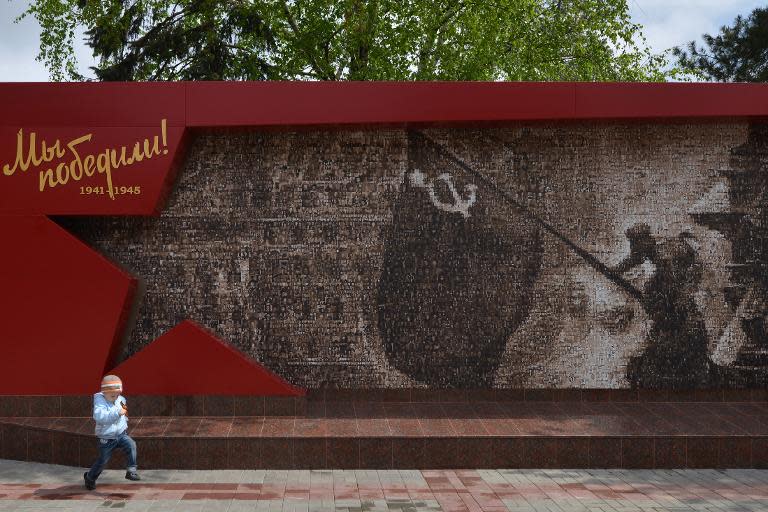'We are victors': Russia fetes WWII win despite Western snub
Russia is preparing this week to celebrate the 70th anniversary of the Soviet victory over Nazi Germany with imperial flair and a military parade viewed as an unapologetic show of force. In what is seen as punishment for the Kremlin's policies on Ukraine, Russia's World War II allies are boycotting the May 9 festivities, leaving President Vladimir Putin to honour the big day in the company of the leaders of China, Cuba and other Moscow-friendly figures. An estimated 27 million of the former Soviet Union's soldiers and civilians were killed in WWII and the Red Army's triumph in the deadliest war in history is seen as a huge point of pride in Russia. Victory Day brings together Russians from all walks of life irrespective of their political sympathies. "It is a day of glory, a day of our people's pride, a day of the highest veneration of a generation of victors," said Putin. In recent years the victory in the 1941-1945 conflict, known in Russia as the Great Patriotic War, has acquired signs of cult status as critics accuse Putin of seeking to co-opt the country's history to boost his personal power. Some pro-Kremlin figures have openly glorified wartime dictator Stalin, while the current patriotic fervour has drowned out unvarnished accounts of Soviet military blunders or infamous "barrier troops" who shot deserters. - 'Drowned in Russian blood' - Viktor Astafyev, a writer known for his grim WWII stories, claims that Russia's war losses were much higher than the estimated 27 million and military commanders won the war at the expense of "a huge amount of blood." "It is they who threw people in the fire like straw," the war veteran wrote in a letter recently published by the independent newspaper Novaya Gazeta, saying "the enemy was bombarded with corpses, was drowned in Russian blood". Putin, who has railed against attempts to belittle Russia's role in WWII, lost many relatives in the war. But he said that his father, who was critically injured, and his mother, who barely survived the Leningrad siege, did not hold a grudge against Nazi soldiers. "They had no hate for the enemy, that's what is surprising," he recently wrote in a poignant column for a Russian magazine. "Honestly, to this day I cannot quite understand it." On May 9 Putin will preside over a Red Square parade that will feature Russia's newest weapons as well as more than 15,000 Russian and foreign troops including Indian brigadiers and Chinese honour guards. In a throwback to Moscow's Soviet-era alliances with Asian and Latin American countries, Putin will host leaders from China, Cuba, India, South Africa and a number of ex-Soviet states who will account for roughly a third of the 68 heads of state and leaders of international organisations invited to attend. -'Teaching West manners'- The leaders of the United States, France and Britain will skip sanctions-hit Russia's festivities, with the gaps in the guest list exposing huge tensions over Moscow's annexation of Crimea last year and support for militants in eastern Ukraine. North Korea's reclusive leader Kim Jong-Un cancelled his planned visit -- replaced by Pyongyang's titular head of state Kim Yong-Nam -- while in a compromise gesture, Germany's Angela Merkel will visit Russia on May 10. Ex-Soviet state Ukraine will not hold a May 9 parade, instead it is to celebrate both Red Army soldiers and fighters of the Ukrainian Insurgent Army (UPA) who battled each other as well as the Nazis. The 70th anniversary celebration will stand in contrast to festivities a decade ago, when Putin hosted the leaders of the United States, France, Germany, Italy and Japan. "The leaders who will be with Putin on the reviewing stand will not be mere guests," said the opposition magazine The New Times. "For Russians it will be a map of the world which is able to confront American diktat." Kremlin-linked political analyst Sergei Karaganov said the main message of the parade was Russia's readiness to defend its interests, by force if necessary. "Russia is locked in an acute confrontation with the West to teach it good manners," he said. - 'Most important holiday' - After the parade, some 165,000 people are expected to march through central Moscow with portraits of relatives who fought in the war. "This is the most important holiday for our family," said Mark Gismatulin, who will carry a portrait of his artilleryman father. "My father reached Berlin and was on the Elbe," he said, referring to the famed German meeting point of Soviet and American troops on April 25, 1945. The 74-year-old said he was not bothered by the Western snub. "They know nothing about the Russian spirit. We are the victors," he told AFP. "I love Putin. I love my homeland." Observers say the surge of patriotism has been fuelled by state television, with viewers offered a constant stream of war films. For the holiday, the Russian capital will be decked out in a sea of flags, banners, period photos and flowers.





